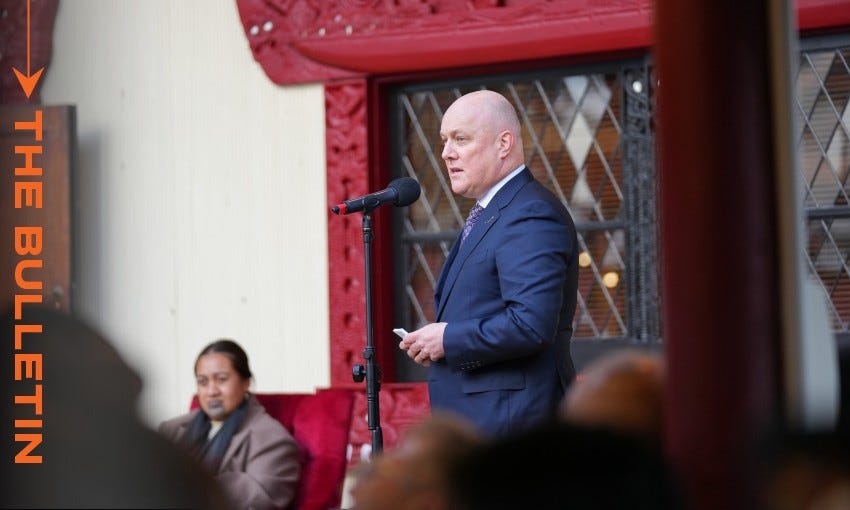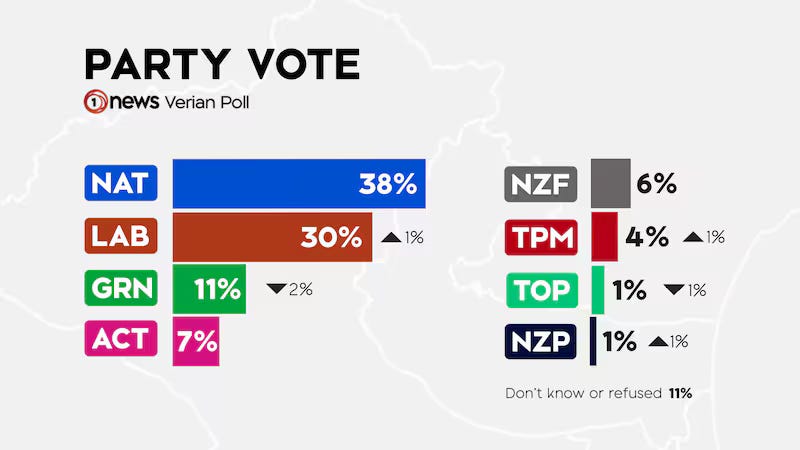New poll exposes coalition's race relations challenge as treaty bill rears its head
The architects of the proposed law weren't at Tūrangawaewae, but that didn't stop others from talking about them.
Mōrena, and welcome to The Bulletin for Tuesday, August 20.
In today’s edition: The Commerce Commission is poised to release its final report on competition in the banking sector, inside our dwindling supply of donated plasma, and a new report exposes the scale of alcohol harm in New Zealand. But first, race relations took centre stage at Koroneihana yesterday.
‘No ambiguity’ over future of treaty bill
The Act Party’s proposed Treaty Principles Bill cast a shadow over proceedings at a rainy Tūrangawaewae marae in Ngāruawāhia yesterday, though no one from Act was there to face the criticism themselves. All parties bar Act were in attendance at Koroneihana, the celebration of the Māori King's coronation, yesterday after confusion over whether or not the party was invited. And all parties at the marae took the opportunity to publicly distance themselves from Act’s proposed bill. Among those was New Zealand First minister Shane Jones, who said there could be “no ambiguity, no doubt” that his party would not vote for the bill beyond its first reading. And prime minister Christopher Luxon issued arguably his strongest rebuke of the bill yet: “I want to be clear today that the National Party will not support the Treaty Principles Bill beyond first reading."
It’s not the first time he has shut down suggestion of pushing the bill further, though even as recently as last Friday he was attempting to make complicated distinctions between his personal views as National leader and his role as prime minister of a coalition. But as RNZ’s Jo Moir argues, despite Seymour’s protests, it would appear there is no longer a lifeline left for the bill. Cabinet has yet to discuss the bill, but details of it were leaked earlier this year and it’s expected to go before parliament toward the end of the year. If you need a quick refresher on the treaty principles and why Act’s bill is contentious, Tommy de Silva wrote an excellent explainer for The Spinoff earlier this year.
Voters believe coalition worsening race tensions
Yesterday’s commemorations coincided with the release of a new poll from TVNZ that suggested voters were worried by the coalition government’s policies on race relations. Just 10% of respondents believed the government was reducing racial tensions in New Zealand, while 46% said its policies were making things worse. Recently, former prime minister John Key urged for people to “take the temperature down a wee bit” around race relations, as the Herald reported here. Just last week, a scathing interim report from the Waitangi Tribunal called the Treaty Principles Bill “discriminatory” and urged the government to drop it from its agenda, as explained by The Post’s Karanama Ruru. The National Party is also under fire after a Facebook page for its Māngere branch posted racist comments under a live stream of yesterday’s proceedings, reported Te Ao Māori News.
Luxon has, for some time now, been attempting to personally temper the conversation around race. But at the same time, as the leader and face of the coalition, he has struggled to distance himself from the debate entirely. Yesterday, Tainui iwi chair Tuku Morgan accused the prime minister of throwing “Māori under the bus and run[ning] them over”, reported the Herald’s Joseph Los'e, while Labour’s Chris Hipkins said the coalition was race-baiting and had never “seen a red neck it didn’t want to scratch”.
Luxon ‘misspoke’ on education figures
While in Australia last week, Luxon was asked to comment on the Waitangi Tribunal’s report and brought up areas he believed the government was able to productively collaborate with Māori on. “Think what we're doing with respect to mathematics – when you have 88% of Māori kids at year 8 unable to read…” said Luxon. Many interpreted those remarks – “unable to read” – to mean Luxon was suggesting that Māori literacy rates at high school were just 12%, but a spokesperson for the prime minister told The Bulletin it was “clear from the context” that he was referencing maths, and said that Luxon “misspoke”. The Herald’s Julia Gabel has delved into this a little more and noted that it came in the same week Luxon was unable to say how much the Jobseeker benefit was during an interview on RNZ’s Morning Report.
Coalition steady in new poll
Despite that poll we mentioned at the top showing close to 50% viewed the government as detrimental to race relations, TVNZ’s political editor Maiki Sherman said it doesn’t appear to have dented support for the coalition. The latest 1News Verian poll released last night showed all three coalition parties steady, meaning they would safely return to government.
The Greens were the only party to lose support (which was picked up by Labour and Te Pāti Māori) after a series of controversies and scandals in recent months. In short, things appear to have settled after an early dip for the government. Luxon himself has bounded up five points in the preferred prime minister stakes to 28% – hardly a rockstar result but comfortably above Labour’s Chris Hipkins and higher than where he was sitting in the same poll going into last year’s election.
Show your support, join up today!
"As a New Zealander living in Sydney, The Spinoff helps me to feel in touch with what's happening back home. There's a great breadth to the content – and the enthusiasm from your contributors is palpable. I feel happy and proud to be a member." Ian, Sydney.
Whether living here or abroad, if you value our work please show your support by becoming a member today.
Banks in the spotlight as ComCom report to be released
The Commerce Commission will release its final report on competition in the banking sector today, and as the Herald’s Jenée Tibshraeny reported, it appears the government is open to taking action. It’s been over a year since the Labour government first ordered the report, which was tasked with finding out whether the personal banking market was “working well for New Zealanders”. An interim report released earlier this year concluded “no”, wrote Catherine McGregor for The Spinoff, finding that the four big banks had a stranglehold.
One key recommendation raised in that interim report was allowing Kiwibank to grow and the government has given hints it’s open to diluting its 100% ownership in order to make this happen, something The Spinoff’s Duncan Greive argued might not be a bad thing. The new report is also likely to pave the way for open banking, as explained by today’s episode of The Detail. We can expect to see that final report released at about 8.30am.
Behind the scenes of our dwindling plasma supply
Demand for plasma donations is increasing by about 10% year-on-year, reports The Spinoff’s Gabi Lardies. For the country’s blood service to be completely self-sufficient again, as we were just over a decade ago, we would need about 250 more plasma donations a week. Lardies explains:
Plasma can currently be made into 11 treatments for cancer patients, trauma and burns victims, pregnant women (where they have a different blood type to their baby), auto-immune diseases, blood-clotting issues and compromised immune systems. The growing demand is driven by a growing need for immunoglobulins, antibodies made by our immune systems that protect us from bacteria and viruses. They are extracted from a healthy donor’s plasma and given to someone who cannot make their own, either because of disease or other treatments.
Jess Quinn on the power of a positive mindset
As a teen she cried herself to sleep every night – now she's a successful entrepreneur, author, model and influencer. Jess Quinn joined Kiwibank's This is Kiwi podcast to talk about the myth of a 'normal' body and why she's a firm believer in faking it till you make it. (sponsored)
Read an excerpt from the interview on The Spinoff now.
Click and Collect
The scale of alcohol harm in New Zealand has been exposed in a new report that found it caused over 900 deaths and 29,282 hospitalisations in 2018. (NZ Herald)
Boy racers could again face having their cars crushed. (Waikato Times)
The Post continues its excellent deep dive into the primary health sector with four charts that explain the GP crisis.
I was fascinated to learn that New Zealand’s major supermarkets bring in almost 43% more revenue than their counterpart supermarkets in the US – particularly interesting given the focus on competition. (Newsroom)
Government reviews $500m research tax credit, which Act wants scrapped (NZ Herald, paywalled)
I had missed the news, reported here by Steve Braunias for Newsroom, that Wellington writer Emily Perkins is adapting her novel Lioness for TV.
Laybuy owes at least $15m, first report details. (BusinessDesk, paywalled)
And here’s a brand new episode of The Fold, on Stuff's CEO leaving and TVNZ pondering a paywall.
Contemplating the changing face of Wellington, Joel MacManus makes the moral case for urbanism. Hera Lindsay Bird rails against "Little People, Big Dreams", an insipid genre of children's publishing. Erin Harrington reviews Head South, a film that is a messy nostalgia trip through post-punk Ōtautahi. Lyric Waiwiri-Smith attends a meeting of Westmere's dwindling anti-cycleway movement. Here are all the new movies and TV on streaming services this week.
That’s it for this morning, thanks for reading. I’ll be back tomorrow.
Want to get in touch? Join the conversation in the Substack comments section or via email at thebulletin@thespinoff.co.nz if you have any feedback on today’s top stories (or anything else in the news).
If you liked what you read today, share The Bulletin with friends, family and colleagues.

















Such a waste of time and money to progress a Bill that everyone knows in advance won't pass. Why not have an adult discussion with the coalition partners & agree to spend the money on some of the areas being cut such as the disabled community? Also not a surprise that Luxon gets his figures wrong - his resume shows someone who left everyone else to do the work & know the details, but when promoting or defending his govt decisions & policies, he needs to show he at least knows the facts they are predicated on.
'Despite that poll we mentioned at the top showing close to 50% viewed the government as detrimental to race relations, TVNZ’s political editor Maiki Sherman said it doesn’t appear to have dented support for the coalition. The latest 1News Verian poll released last night showed all three coalition parties steady, meaning they would safely return to government.'
Perhaps the disparity is because if 46% of those polled think the Government is making race relations worse, then maybe the other 54% do not think the Government is making race relations worse.